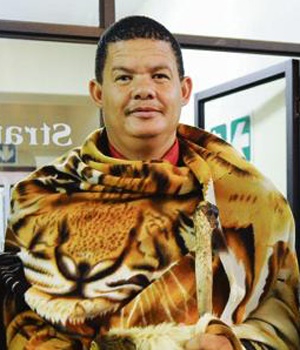
The Traditional and Khoisan Leadership Bill is honest about one thing: It dispenses with the preamble about democracy and transformation in the 2003 Traditional Leadership and Governance Framework Act it sets out to repeal.
While the bill seeks to enable national and provincial government to empower traditional structures through opaque delegations of governmental power, nowhere does it require traditional councils or leaders to consult with, or obtain the consent of, their subjects regarding decisions that will radically affect livelihoods and land rights.
To appear even-handed, the drafters explain in their memorandum on the bill: “All of these [traditional and Khoisan] councils must keep proper records, and their financial statements must be audited. The councils must meet with their respective communities at least once a year to give account of their activities and finances.”
Traditional leaders such as Kgosi Nyalala Pilane of the Bakgatla-ba-Kgafela in North West have tried to expand the somewhat limited powers conferred on officially recognised traditional leaders by the existing framework act.
They insist they are the only people with the legal standing to call meetings or to represent the community in dealings with investors.
Pilane has successfully interdicted members of his community several times from calling meetings to discuss accountability for community revenues.
Fortunately, his version of customary law has since been rejected in two Constitutional Court judgments about the Bakgatla-ba-Kgafela and in a recent judgment in the Eastern Cape that people in Cala have the right to elect their leaders.
Problems of accountability relating to unilateral decisions about valuable community resources are much wider than only the Bakgatla. There are 102 traditional councils in North West.
Research by the Centre for Law and Society recently confirmed that not one of them has been audited by the Auditor-General since 1994. Nor has the national or provincial government intervened to ask why.
Despite the massive platinum mining boom that generated sky-high profits for some people and fuelled the destruction of the houses, fields and graves of many others, neither the government nor the people of the province have been given any accounting for the revenues due to traditional communities that host the mines.
Current legislation, although largely ignored, requires every traditional community to deposit all revenues from whatever source into an account opened and monitored by the premier of the relevant province.
The bill, which will repeal the existing law, requires only that communities maintain proper financial records that must be audited at unspecified intervals.
Rural communities complain repeatedly that only a small elite benefits from mining on their land, while those directly affected get poorer and are shut out of any information about the deals being done on their behalf.
The bill offers them no comfort.
Boyle is a senior researcher at the Centre for Law and Society at the University of Cape Town
Talk to us: Will this proposed legislation take SA forwards or backwards?




 Publications
Publications
 Partners
Partners








